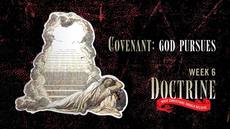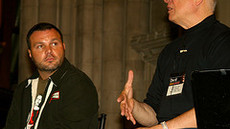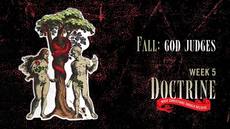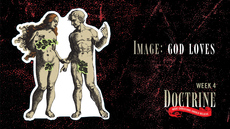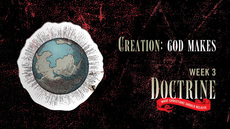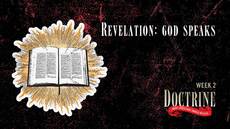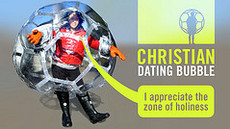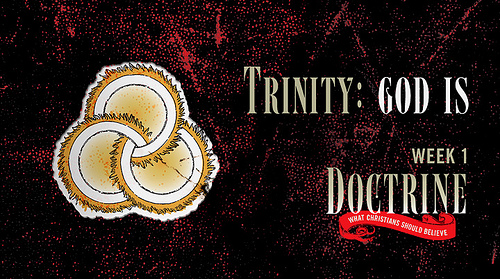 This blog is intended to augment my recent sermon on the Trinity as the first of thirteen sermons in the series Doctrine: What Christians Should Believe. The new series will follow the storyline of the Bible and serve as a class of sorts, teaching the essential truths of Christian doctrine. With so many new people and new Christians at Mars Hill Church, the hope is to ground people in sound doctrine while also refreshing and further instructing our more mature church members. When the series is completed, Dr. Gerry Breshears and I will write the content as a book for Crossway in our Vintage Jesus line and deal with the issues in even greater detail. Until then, this blog will be utilized to serve people who want to study the sermon topics further.
This blog is intended to augment my recent sermon on the Trinity as the first of thirteen sermons in the series Doctrine: What Christians Should Believe. The new series will follow the storyline of the Bible and serve as a class of sorts, teaching the essential truths of Christian doctrine. With so many new people and new Christians at Mars Hill Church, the hope is to ground people in sound doctrine while also refreshing and further instructing our more mature church members. When the series is completed, Dr. Gerry Breshears and I will write the content as a book for Crossway in our Vintage Jesus line and deal with the issues in even greater detail. Until then, this blog will be utilized to serve people who want to study the sermon topics further.
While the word trinity does not appear in Scripture, the concept very clearly does. The church father Tertullian (AD 155–220) was the first to use the word trinity in an effort to summarize a great amount of biblical truth. To say that God exists as a trinity does not mean there are three Gods, or that one God merely manifests himself as either Father, Son, or Holy Spirit on various occasions.
The Westminster Confession of Faith (1647) summarizes the doctrine by saying "In the unity of the Godhead there be three persons, of one substance, power, and eternity: God the Father, God the Son, and God the Holy Ghost." Wayne Grudem defines the doctrine of the Trinity as follows: "God eternally exists as three persons, Father, Son, and Holy Spirit, and each person is fully God, and there is one God" (Grudem, Systematic Theology, p. 226). Bruce Ware provides another helpful definition: "The doctrine of the Trinity affirms that God’s whole and undivided essence belongs equally, eternally, simultaneously, and fully to each of the three distinct Persons of the Godhead." (Ware, Father, Son, and Holy Spirit, p. 41). Louis Berkhof explained the doctrine of the Trinity under these headings:
- There is in the Divine Being but one indivisible essence.
- In this one Divine Being there are three Persons or individual subsistences: Father, Son and Holy Spirit.
- The whole undivided essence of God belongs equally to each of the three persons.
- The subsistence and operation of the three persons in the divine Being is marked by a certain definite order.
- There are certain personal attributes by which the three persons are distinguished.
- The Church confesses the Trinity to be a mystery beyond the comprehension of man. (Berkhof, Systematic Theology, pp. 87–89)
In my sermon, I used my definition: The Trinity is one God who eternally exists as three distinct persons—Father, Son, and Spirit—who are each fully and equally God.
"Person" does not mean that God the Father or God the Spirit became human beings. Rather, it means that each member of the Trinity thinks, acts, feels, speaks, and relates because they are persons and not impersonal forces. Further, each member of the Trinity is equally God, which means that they share the divine attributes, such as eternality, omniscience, omnipotence, and omnipresence.
The doctrine of the Trinity seeks to hold all of the truth that God says about himself in Scripture, such as the following truths, without dismissing or diminishing any truth.
There is only One God.
- ". . . the LORD is God; there is no other besides him" (Deut. 4:35).
- ". . . there is no god beside me" (Deut. 32:39).
- ". . . you alone are God" (Ps 86:10).
- "Before me no god was formed, nor shall there be any after me" (Isa. 43:10).
- "I am the LORD, and there is no other, besides me there is no God" (Isa. 45:5).
- ". . . the King of ages, immortal, invisible, the only God" (1 Tim. 1:17).
- ". . . there is one God" (1 Tim. 2:5).
All other gods are demonic false gods.
- ". . . the only true God" (John 17:3).
- "They sacrificed to demons that were no gods" (Deut. 32:17).
- ". . . what pagans sacrifice they offer to demons and not to God. I do not want you to be participants with demons" (1 Cor. 10:20).
The Father is God.
- "God the Father" (John 6:27).
- ". . . there is one God, the Father" (1 Cor. 8:6).
The Son is God.
- "In the beginning was the Word, and the Word was with God, and the Word was God. . . . And the Word became flesh and dwelt among us" (John 1:1, 14).
- "Truly, truly, I [Jesus] say to you, before Abraham was, I am" (John 8:58).
- "Thomas answered him [Jesus], ‘My Lord and my God!’" (John 20:28).
- ". . . Christ who is God over all" (Rom. 9:5).
- ". . . our great God and Savior Jesus Christ" (Titus 2:13).
- ". . . Jesus Christ. He is the true God" (1 John 5:20).
The Spirit is God.
Note: It must be stressed that the Spirit is a "he" and not an "it." The Spirit is not an impersonal force, but rather a person who can be grieved (Eph. 4:30), resisted (Acts 7:51), and outraged (Heb. 10:29).- "Now the Lord is the Spirit, and where the Spirit of the Lord is, there is freedom. And we all, with unveiled face, beholding the glory of the Lord, are being transformed into the same image from one degree of glory to another. For this comes from the Lord who is the Spirit" (2 Cor. 3:17–18).
- "But Peter said, ‘Ananias, why has Satan filled your heart to lie to the Holy Spirit and to keep back for yourself part of the proceeds of the land? . . . You have not lied to men but to God’" (Acts 5:3–4).
Furthermore, in the sermon we considered how the statement "God is love" in 1 John 4:8 only makes sense in light of the fact that God is a perfectly loving Trinitarian community. This insight also helps illuminate what Jesus said in John 3:35, "The Father loves the Son," and in John 14:31, "I love the Father."
Additionally, the echoes of the Trinity in the early pages of Genesis also make sense:
- "In the beginning, God created the heavens and the earth. The earth was without form and void, and darkness was over the face of the deep. And the Spirit of God was hovering over the face of the waters" (Gen. 1:1–2).
- "Then God said, ‘Let us make man in our image, after our likeness’" (Gen. 1:26).
- "Then the LORD God said, ‘Behold, the man has become like one of us" (Gen. 3:22).
- "And the LORD said . . . ‘Come, let us . . .’" (Gen. 11:6–7).
Lastly, two of my favorite verses on the Trinity in the Old Testament apply directly to the incarnation of Jesus:
- "And now the Lord GOD [Father] has sent me [Jesus], and his Spirit" (Isa. 48:16).
- "The Spirit of the Lord GOD [Father] is upon me [Jesus], because the LORD has anointed me to bring good news to the poor" (Isa. 61:1).
As an insightful aside, Jesus began his public ministry by reading Isaiah 61:1, according to Luke 4.
We also examined a few places in the New Testament where the Trinity appears, including the birth of Jesus (Luke 1:35), the baptism of Jesus (Matt. 3:16–17), and the Great Commission of Jesus (Matt. 28:19–20).
For Further Study
- The Trinity by Roger E. Olson and Christopher A. Hall (163 pages) is a helpful overview of the history of the Trinity in church council, creeds, and theologians.
- Father, Son, and Holy Spirit by Bruce Ware (176 pages) is a solid basic introduction to the Trinity and also a very practical examination of how it sets the pattern for human relationships including marriage.
- The Forgotten Trinity by James White (224 pages) is a solid introduction to the doctrine and history of the Trinity.
- Making Sense of the Trinity by Millard J. Erickson (112 pages) is a good introduction and overview of the Trinity.
- "The Biblical Basis of the Doctrine of the Trinity" from Christian Research Institute
- "Tampering With the Trinity: Does the Son Submit to His Father?" by Bruce Ware
- "The Trinity, the Definition of Chalcedon, and Oneness Theology" by James White
- "The Nature of God – The Tri-Unity of God" by James White
